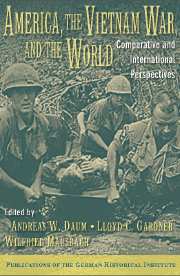Book contents
- Frontmatter
- Introduction
- Part One Relocating Vietnam Comparisons in Time and Space
- Part Two International Relations and the Dynamics of Alliance Politics
- 7 Who Paid for America’s War?
- 8 America Isolated
- 9 Bamboo in the Shadows
- 10 The Strategic Concerns of a Regional Power
- 11 People’s Warfare Versus Peaceful Coexistence
- Part Three Recasting Vietnam: Domestic Scenes and Discourses
- Index
11 - People’s Warfare Versus Peaceful Coexistence
Vietnam and the Sino-Soviet Struggle for Ideological Supremacy
Published online by Cambridge University Press: 05 January 2013
- Frontmatter
- Introduction
- Part One Relocating Vietnam Comparisons in Time and Space
- Part Two International Relations and the Dynamics of Alliance Politics
- 7 Who Paid for America’s War?
- 8 America Isolated
- 9 Bamboo in the Shadows
- 10 The Strategic Concerns of a Regional Power
- 11 People’s Warfare Versus Peaceful Coexistence
- Part Three Recasting Vietnam: Domestic Scenes and Discourses
- Index
Summary
Western historiography on the Vietnam War focuses predominately on America's involvement and its impact on U.S. foreign and domestic policy, with all these facets summarized under the apt heading of America's Vietnam trauma. Because neither the Soviet Union nor the People's Republic of China was directly involved in sending troops into battle, there is no comparable trauma in either country. Instead, Moscow and Beijing preferred to act behind the scenes and let their Vietnamese comrades play the game of trial-and-error in the Sino-Soviet dispute over the future of world communism and its attitude toward the West. Vietnam became an object of prestige in the persistent Sino-Soviet struggle for ideological supremacy.
Shortly after the breakdown of the Soviet Union, in 1992-3, the archive of the former Communist Party of the Soviet Union (CPSU) released documents on this topic, and Russian scholars also published a number of pertinent articles and books. However, a diplomatic scandal provoked by the New York Times in late 1993 led to a restriction in access. The most revealing documents are stored behind an “iron curtain” in the Archive of the President of the Russian Federation (APRF), namely, the military and the former KGB archives. An opening of the archives in the People's Republic of China is not to be expected in the near future. From time to time the Party Committee of the Chinese Communist Party (CCP) publishes some documents on China's role in the Cold War as well as on the Korean and Vietnam conflicts, but these documents are selective.
- Type
- Chapter
- Information
- America, the Vietnam War, and the WorldComparative and International Perspectives, pp. 237 - 256Publisher: Cambridge University PressPrint publication year: 2003



